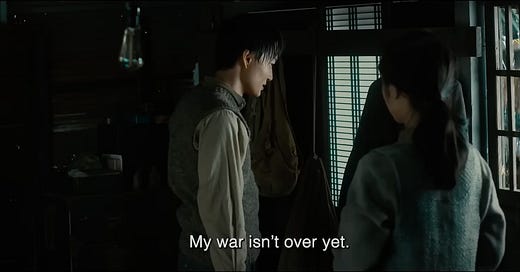Your War Is Over | PASSAGES :009
"From fearful fragmentation to fearless fullness" and the best movie of last year
“May we light the fire… that burns out the ego and enables us to pass from fearful fragmentation to fearless fullness in the changeless whole.” —Katha Upanishad
My favorite movie of 2023 was a Godzilla movie.
There, I said it.
Not the big, bloated Godzilla x Kong: The New Empire movie that is coming out in 2024 (btw, give me anything Planet of the Apes over anything Kong anytime, thank you very much). I’m talking about the Japanese epic kaiju film Godzilla Minus One. It’s not just a kaiju, or “strange beast” movie, but as one reviewer put it, “It’s a period piece. A love story. An exploration of courage, trauma, and found family. It’s a monster movie that does far more than it has to and solidifies itself as an all-timer.” Amen.
The story centers around Kōichi Shikishima, a former kamikaze pilot, which is a bit of a problem since a former kamikaze pilot—if they did their job—should be, uh, pretty dead. Shikishima is wrestling with this reality. He’s disgraced. He’s ashamed. Even though World War II has ended, his “war is not over yet,” a line repeated throughout the movie. He wants a shot at redemption.
I was moved by Shikishima’s story which, along with other redemptive arcs in the movie, is interwoven with awesome scenes of Godzilla wreaking havoc on ships and cities and everything else. And with this “war is not over yet” theme, I also couldn’t help but think of wilderness guide and eco-depth psychologist Bill Plotkin’s concept of the loyal soldier, a term he uses when talking about the journey from an ego-centric way of being to a soul-centric way of being.
Plotkin’s idea—which Franciscan priest Richard Rohr popularizes—is similarly inspired by kamikaze pilots in post-World War II Japan. A few years after the war had ended, pilots were discovered marooned on an island. These pilots didn’t know that the war had ended and they were carrying on with their routines and duties as if the war was still going on, as if they still had a crucial role to play. Instead of shaming these soldiers, i.e., You idiots! The war is over! Why are you carrying on like this?, the Japanese people honored them. They were welcomed back home, where they were officially discharged. The war is over, they were told, Thank you for your service, but the role you played is no longer needed.
This is how we need to treat our sub-personalities, Plotkin says, the various parts of ourselves that have played a critical role in our development, surface versions of ourselves that have kept us safe or allowed us to fit in but that are no longer needed—controller, victim, achiever, escapist, conformist, rebel, perfectionist, etc. We don’t need to shame these parts of ourselves. We don’t need to judge them. We don’t need to take them out back and beat them up.
Instead, our true transformation lies in our ability to welcome home these loyal soldiers, to thank them for their service and to release them from their duties. Because, ultimately, we will continue to live in “fearful fragmentation” if we shame these parts of ourselves into the shadows or if we allow them to carry on as if their war games are still needed. What once was a help becomes a hindrance. The former ally becomes an adversary to our capacity to live in “fearless fullness.”
In Godzilla Minus One, the loyal soldier Shikishima needed to commit a brave act to end his war. Not so for you. Your situation is the opposite…
Your war is already over, you just might not realize it yet.
Your loyal soldier has performed its part in your development.
For you—if you want to grow into your most authentic self—it’s going to take bravery after the end of your war: to see your loyal soldier, to treat it with kindness and curiosity, and to let it know that its work is finished.






Hi Ben. I enjoyed this edition of STILL. It made interested in checking out more by Ben Plotkin. I noticed that three of his audiobooks are free on audible for members: Soulcraft, Nature and the Human Soul and Wild Mind. Let me know if there’s one you’d recommend starting with. Thanks!